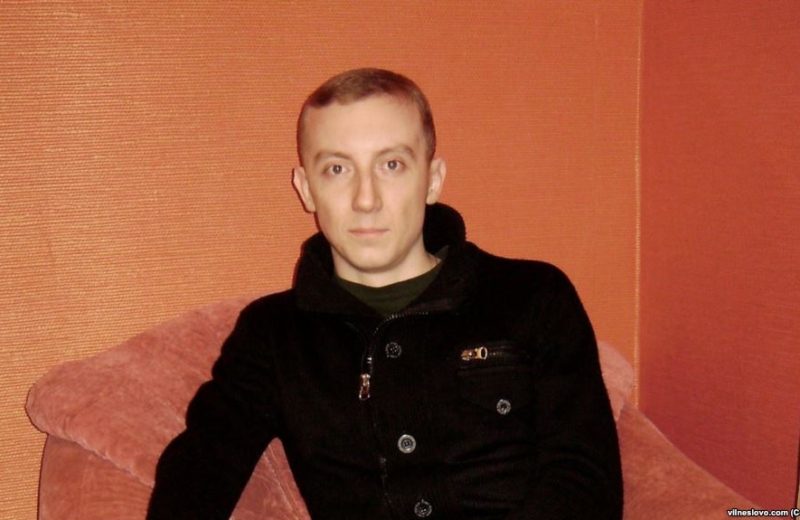This story has been updated to include comments from Yegor Firsov.
A Russian television channel has aired an interview with kidnapped journalist Stanislav Aseev, in which he confesses to working for Ukrainian intelligence in the Russian-occupied Donbas.
Broadcast on the Rossiya 24 television channel on Aug. 17, the interview has raised concerns that Aseev, who has been imprisoned in Donetsk for over a year, was coerced into confessing to false espionage charges.
Aseev is not undergoing any legal process by a recognized state. Russian proxy forces have occupied the part of the Donbas where Aseev is being held since April 2014.
The broadcast is the latest development in what Aseev’s supporters suggest is an information campaign against the journalist.
Russia-led fighters have “beaten” a confession out of the journalist, Aseev’s friend Yegor Firsov, a former Ukrainian parliamentarian, wrote on Facebook.
“I have the feeling that they forced Stas to confess to everything they could imagine,” he added.
One-on-one
After Russia invaded the Donbas in 2014, Aseev remained in the city of Donetsk and began chronicling life under Russian occupation for pro-Kyiv news outlets like Ukrainska Pravda, Zerkalo Tizhnya and Radio Free Europe/Radio Liberty. He published all his articles under the pen name Stanislav Vasin, to avoid detection.
Although he could not conduct interviews or work openly, Aseev’s undercover reporting offered one of the clearest windows into the daily life, politics, and the ideology of the Russian-controlled area
Then, on June 3, 2017, Aseev abruptly disappeared. He later turned up in captivity of the Russian-installed authorities, where he has remained since.
Occasionally information about Aseev and his predicament trickles out, usually through Firsov or former prisoners. On June 28, Aseev launched a hunger strike in protest of mistreatment in captivity.
The Rossiya 24 interview likely represents the first time Aseev has been seen by the broader public since last year.
An online video of the program shows Aseev being brought to the Nadezhda Krupskaya Library in Donetsk to be interviewed by Russian war journalist Aleksandr Sladkov.
Seated across from Aseev in one of the library’s reading rooms, Sladkov asks the journalist whether he identifies as a writer or a spy. Aseev answers that he is foremost a columnist, but does not deny the charges he is facing on the occupied territories: espionage.
“I recognize these allegations, and I do not deny them. I am completely openly saying that I worked for the Main Intelligence Directorate of Ukraine,” Aseev says, referring to Kyiv’s military intelligence office.
Later in the interview, Aseev recounts events previously only described in several posts on “A Russian in Donbas,” a channel on the Yandex.Zen platform, which is blocked in Ukraine. The channel, which presents its contents as the writings of a Russian who fought for three years in the Donbas, published what it claimed were four entries in Aseev’s personal diary last month.
In the supposed diary entries, the author describes carrying out reconnaissance and espionage work for Ukraine’s Defense Ministry, efforts that often preceded an explosion or the appearance of a Ukrainian flag in Donetsk. But the texts also advance certain Russian propaganda narratives and contain plotlines that strain believability, such as the author’s romance with a wealthy Catholic woman from Ukraine’s far western Carpathian region.
In the Rossiya 24 interview, Aseev describes being recruited by Ukrainian intelligence, something featured in the “diary.” He also recounts posing as a mourner to scope out a site located near a Donetsk cemetery — another event from the “diary.”
After the texts were published on “A Russian in Donbas,” friend Firsov speculated the diary was created to fabricate a case against the journalist.
“As far as I can tell, the militants’ goal is to convince everyone that Stas (Aseev) is not a journalist, but a spy,” Firsov wrote in a Facebook post on July 18. “They want to build the charges and the rest of the court case on this. Specifically because these publications of his ‘diary’ appeared.”
The Rossiya 24 interview hints that there could be more information to come. Sladkov asks Aseev about an unfinished autobiographical novel he was supposedly writing, titled “Sketches.” The Russian journalist suggests Aseev modeled his life to match what he wanted to feature in the novel.
Sladkov asks Aseev how much of the espionage descriptions in the novel are true.
“A hundred percent,” Aseev answers.
Firsov had never before heard of such a novel, although he admits Aseev could have been writing one. “But as for everything that was said in the [Rossiya 24 news] story, I am sure that most of it is lies,” he told the Kyiv Post.
Forced confession?
Firsov has cast doubt on the veracity of Aseev’s confession, suggesting that several non-interview scenes in the broadcast appear faked. In his Facebook post, he described the interview as featuring “the entire collection of fakes” — espionage, Kyiv-based intel curators, the diary, and Aseev joining the pro-Kyiv Donbas Batallion.
According to his sources, the separatists initially planned to tie Aseev to the murders of Arseny “Motorola” Pavlov and Mikhail “Givi” Tolstykh, two militant commanders assassinated in 2016 and 2017, respectively. “Then something changed, maybe they thought this [allegation] was improbable, and decided to twist and rethink the story in a different direction,” Firsov told the Kyiv Post
Others also do not believe Aseev’s confession. In a comment on Firsov’s Facebook post, Igor Kozlovskyy — a renowned Ukrainian scholar who was freed from a separatist prison in a December 2017 prisoner exchange — wrote that he had long expected something like this.
The Russian-backed militants “try to make everyone give such an interview, and many do it,” he wrote. “You can’t blame them… (Aseev) agreed to the interview, and that means they threatened him or his family or promised them something. Likely both.”
Firsov doubts that this will be the last time Aseev appears in the media.
“There will be press conferences and other events through which they will try to convince us that Stas is a spy,” he wrote.



